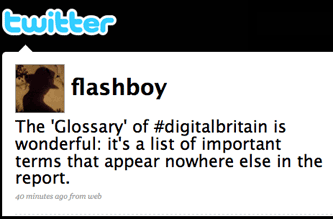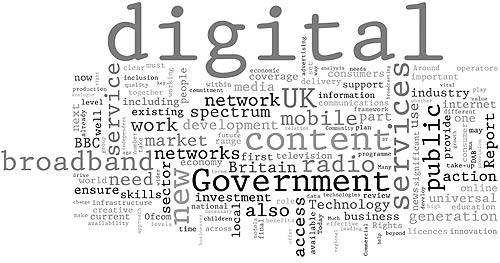"Digital Britain" around the blog'n'tweetosphere
There will be lots and lots of ink used tomorrow in the press to publish the views of the professional media commentariat on today's "Digital Britain" report. I thought it might be worthwhile rounding up some of the early online reaction in the blog'n'tweetosphere.

"Digital Britain promises universally slow broadband" was the unimpressed headline from informitv. They suggested that Carter's 'unambitious' broadband targets should be pretty easy to meet given that:
"it can already be delivered to over 90% of the population. The average broadband home in Britain actually receives around 3.6Mbps at the moment."
One of the biggest questions is whether any of this will be particularly binding to our digital future in the real world. The report does not take the same stance as Conservative policy, which is a missed opportunity according to Jeremy Hunt at Conservative Home:
"The tragedy is that many in the industry hoped the new broadcasting minister Stephen Carter would get a grip and show leadership. Instead, as France, Germany and the US lay fibre optic cable to people's homes, we are stuck in the information slow lane - or will be until there is a Conservative government. David Cameron has pledged that a future Conservative government will aim to get superfast broadband to the majority of the population within 5 years."
No Rock And Roll Fun was typically forthright about the anti-piracy provisions in the document:
"You have to weep at the idea that anyone could publish a document supposedly shaping the nation's electronic future while believing that online piracy is something that can be stamped out. It's like thinking that taking on a few more police and making Crimewatch UK go weekly will stop all burglaries, forever."
Patricio Robles at Econsultancy also looked at the ramifications for broadband users and music fans:
"The reality is that instead of investing significant resources in fighting consumer piracy, intellectual property owners would probably be better served working on ways to turn more individuals into paying customers and focusing their enforcement efforts on large-scale commercial piracy. If UK internet users are going to be taxed, they should at least get something in return. How about unlimited access to music and movie downloads?"
As it has been argued before - the Internet has also cost pr0nography publishers money. No Government would dream of imposing a tax on everyone with an Internet connection to compensate companies for the illegal consumption of pirated pr0n, so why is the music industry a special case?
Gary Marshall at Tech Radar files the possible broadband tax as the WTF? in his "The Good, The Bad and the WTF?" round-up.
Tom Phillips was particularly scathing on Twitter:
"Wow, people weren't lying about how badly written the Digital Britain report is. Reads like a seven-year-old's hastily written homework."
"The 'Glossary' of #digitalbritain is wonderful: it's a list of important terms that appear nowhere else in the report."

@mattbuck_hack thought I seemed "rather cross" about the report in their blog post on the topic. I suggested "terse" was the more appropriate word.
Of course, none of us will really know what to think about it all unless @stephenfry expresses an opinion.
